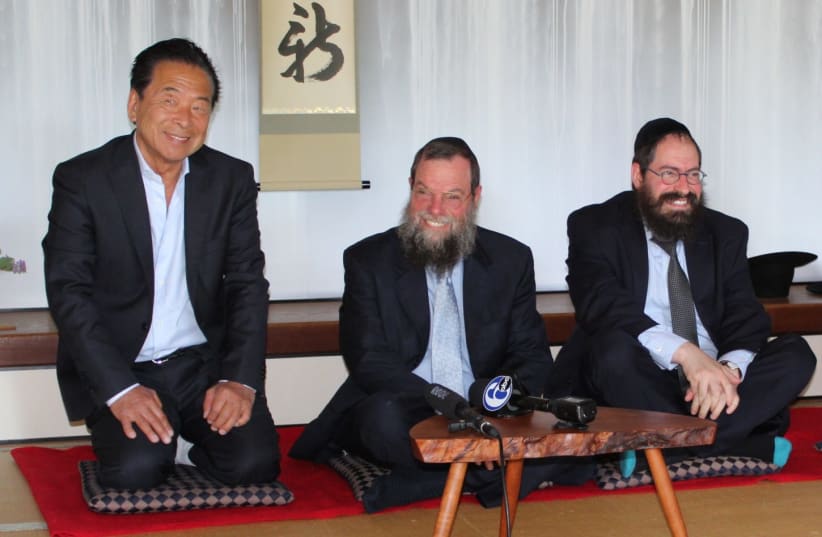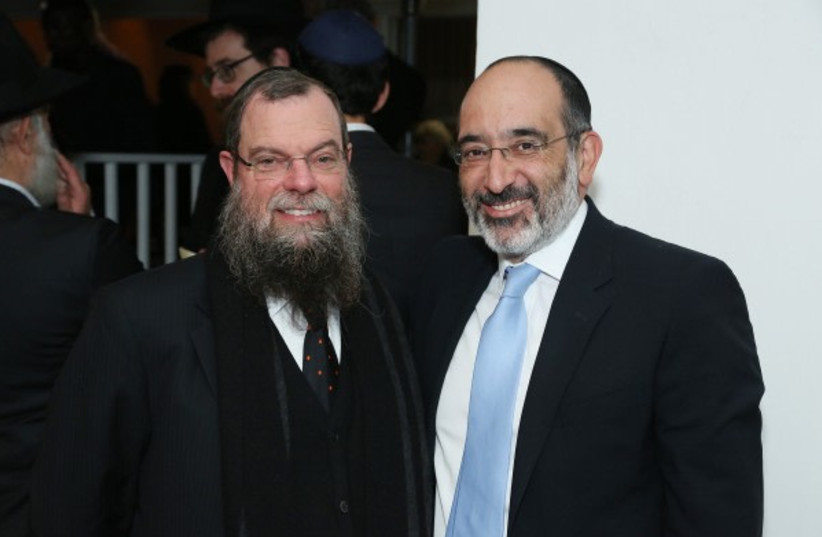For more than 30 years, people coming to pray in Johannesburg’s largest synagogue have been greeted by a familiar sight: Rabbi Yossy Goldman sitting by his dais, ready to lead the service. Be it a Friday night, Shabbat day or Yom Kippur. For bar mitzvahs and weddings, brit milahs and funerals, Goldman has been there. Inspiring, teaching, comforting and uplifting his community. The rabbi, together with his wife, Rochel, have transformed Sydenham Shul, in the words of the late Rabbi Lord Jonathan Sacks, into “one of the great synagogues of the English-speaking world,” while helping steer South Africa’s Jewish community into the post-Apartheid era.
From radio shows to Mishnah and Talmud classes, teaching everything from aleph bet to philosophy, Yiddish classes and how to bake challah, the Goldmans have dedicated their lives and given their heart and souls to spreading Judaism throughout their community.
For the rabbi, a self-described “marketer” of Torah and Judaism, after 34 years of leading his community, the time has come to pass on the mantle of leadership to Rabbi Yehuda Stern, who has been the synagogue’s associate rabbi for the past 14 years. But this is not the end of the journey, notes Goldman. It is a transition, a turning f the page to a new chapter.
“While I have reinvented myself more than once over the years, a new generation now looms,” he said. “If we are to grow the shul and attract younger families, we will need new approaches, fresh ideas, and indeed, new blood.”
The announcement of the transition has brought with it an outpouring of praise for the Goldmans. “I’ve been involved with Sydenham Shul all my life,” said Ingrid Seeff. “As a couple, the Goldmans have inspired me and made an indelible impression on my family’s lives. And we will always be so grateful to them for their friendship and leadership.”
“I met Rabbi Goldman in 1986, when I was a member of the Shul Council,” says Judge Phillip Boruchowitz, a former member of the South African High Court. “I had previously interacted with the rabbis of the shul, and each had their own ‘brand.’ But there was nothing to beat the special Goldman brand. Together with Rochel, he introduced an energy and vibrancy that previously did not exist. They were able in a short amount of time to capture the imagination of young and older members alike. They introduced a new and refreshing way of looking at Judaism through the eyes of Chassidic teaching and especially the teachings of the Rebbe [Rabbi Menachem M. Schneerson, of righteous memory].”
When Judge Boruchowitz first met the Goldmans, in 1986, they had already been spreading the depth and joy of Chassidic teachings for a decade. In an article on Jewish life in South Africa over the past 50 years, “How the Rebbe Saved South African Jewry,” Goldman describes his arrival in Johannesburg in 1976, only three months before the Soweto uprising that would become a major milestone in the eventual fall of the racist apartheid regime:
“The country was in turmoil. Masses of white families were leaving in droves. People here told us they couldn’t understand how a young couple with two small children would move to South Africa when everyone else was leaving. The park benches had signs stating, “Whites Only.” There were separate buses, separate waiting lines in the post office, separate counters in the liquor stores. And there was palpable anxiety in the heart of virtually every white South African.
In the 70s and 80s there were not many South African-born rabbis here. With the political situation so volatile, British and American rabbis were no longer considering positions here, and even rabbis who were already here were leaving. So many families were emigrating that the community was being decimated. What would become of all the schools, synagogues, and proud institutional infrastructure?
During this period of uncertainty, the Rebbe sent his rabbinical students to serve this community as his emissaries, giving South Africa a massive vote of confidence.
In 1979, with its small school in Yeoville now bursting at the seams, the Lubavitch Foundation purchased a large tract of land in the prime northern suburbs of Johannesburg. Property prices were down; it was an unbelievably good deal. The Torah Academy would now be able to expand and unlock much exciting potential.
But the lay leaders of this community, namely the Jewish Board of Deputies, Zionist Federation, Board of Jewish Education, Israel United Appeal and United Communal Fund all attempted to prevail upon us that we should abandon our “reckless empire building.” South African Jewry was “in decline,” they stressed. There wouldn’t be enough children or sufficient financial resources in the community to support another stream of Jewish education, they argued. When we respectfully disagreed, they wrote a letter to the Rebbe, signed by the chairmen of the Board and the Federation, asking him to curb his errant emissaries.
The Rebbe responded with a long letter encouraging those lay leaders to do their utmost to reverse the very decline they had referred to. He praised our strong, warmly traditional Jewish community and also highlighted its proud relationship with Israel. He further pointed out that Jewish communities the world over played an important partner role with Israel in influencing their local governments to maintain positive international relations with the Jewish state. We had to do our part, too.
In a recent interview with Chabad.org, Goldman marveled at the rabbi’s love for his fellow Jews. “It was at this time, after 10 years of outreach, that I was approached by the Sydenham Shul Chairman to take over as the rabbi,” said Goldman. “The former rabbi of Sydenham Shul had just announced that he was emigrating. I wrote a letter to the Rebbe explaining the situation.”
“I was very invested in the Chabad activities,” the rabbi continued. “I had established the very first Chabad House in the country, and then the Torah Academy Shul, and I was directing all the outreach programs of Chabad. The Rebbe told me to first consult with the leaders of the Chabad community in Johannesburg. We had a meeting, and it was unanimous. I wrote back to the Rebbe telling him the decision was unanimous, and I received a beautiful Brachah from the Rebbe to accept the position at the Sydenham Shul.”
“The Rebbe loves every Jew,” said Goldman. “If Chabad was just a corporation, they would never let one of their top guys leave the organization. Here’s the head of the movement encouraging one of its successful leaders to leave the movement for another organization. But the Rebbe was concerned for every Jew and every shul regardless. Sydenham Shul is not a Chabad shul, and at the time, it was unheard of for the big mainstream shuls here to hire a Lubavitcher. Today, thank God, it is quite common practice in South Africa.”
Over the following decades, the Goldmans had a deep impact on the South African Jewish community. The Rabbi was elected Chairman of the South African Rabbinical Association and presided over meetings with the full spectrum of the Rabbinate and doing much for local rabbis over a 12-year period. His influence reached across the country way beyond Sydenham Shul. He continues today as the association’s president.
Adrian Gore, CEO of the Discovery Group, a multinational health and financial-services organization, said, “He has built an incredibly powerful community that is not just powerful in and of itself, but has had a significant impact on the Jewish community in the entire country, and therefore the country itself. Rabbi Goldman is an incredibly powerful and important leader. I find him so effective in making an impact. He’s someone who’s accessible, he is humorous, and has a light intimate touch. But don’t be fooled by that; he’s someone of considerable gravitas, a very deeply learned man. And that paradox makes him such a powerful and effective leader. His legacy is going to be incredibly strong.”
The new leadership is taking the helm with the Goldmans’ encouragement and support. Rabbi Yehuda and Estee Stern were brought over from Melbourne, Australia, 14 years ago by Sydenham Shul as associate rabbi to lead the “Shtibl,” the alternative minyan. Immediately, the Sterns formed a powerful connection and chemistry with both the Goldmans and the Sydenham family. The many initiatives and projects that they started have built the Shtibl into a blossoming family and have brought back many second- and third-generation members that were drifting away. And they developed a Young Adult following, which now can help build an exciting future for the congregation.
Stanley Seeff, president of Sydenham Shul, said, “Rabbi Stern has been appointed rabbi of Sydenham Shul and now assumes the everyday responsibilities required of our spiritual leader. Rabbi Goldman, supported by the Shul Council, believes that Rabbi Stern has the talent, ability and energy to continue to build our special congregation. Rabbi Yehuda and Estee have endeared themselves to our community and have been the driving force behind so many ground-breaking and innovative initiatives. We are well-positioned for new development and growth in the years ahead.”
“We all have such high hopes for Rabbi and Rebbetzin Stern,” said South Africa’s Chief Rabbi Warren Goldstein. “We have seen them over these years serve the community in so many different ways. With their warmth and kindness, with their brilliance in teaching, their learning and compassion. The way that they understand people and the way that they innovate, and are always thinking of new opportunities to grow the shul. We’ve seen them do it in the Shtibl and now we know they are going to do it for the entire congregation, and that is something that is so exciting for South African Jewry – to see talented visionary leaders coming to the fore to make a difference.”
As Goldman moves into an emeritus role, he is determined for his good works to continue.
“Let me assure you that I am not retiring to the coast to spend my life going fishing,” he said. “I vividly recall my own great teacher and mentor – the Rebbe, of righteous memory – speaking at his own 70th birthday farbrengen saying that people have been telling him to slow down now, take it easy or go on vacation. Instead, the Rebbe called for the establishment of at least 71 new institutions that year! The word ‘retirement’ simply did not appear in the Rebbe’s lexicon. Life must always be purposeful, productive and meaningful, he believed.”
“We all have a responsibility to keep making the world a better place in whichever way each of us is able,” continued Goldman. “Indeed, it is my intention to continue to work diligently and vigorously on new projects and to continue my mission for which the Rebbe sent us to South Africa. While we do hope to travel and be able to accept speaking invitations from around the world, we certainly do not intend, God forbid, to abandon Sydenham Shul, and all the wonderful people and families Rochel and I have developed such strong friendships and relationships with over the past decades. They are a very big and very precious part of our lives, and please God, will continue to be so forever.”
This article first appeared on Chabad.org Magazine.

